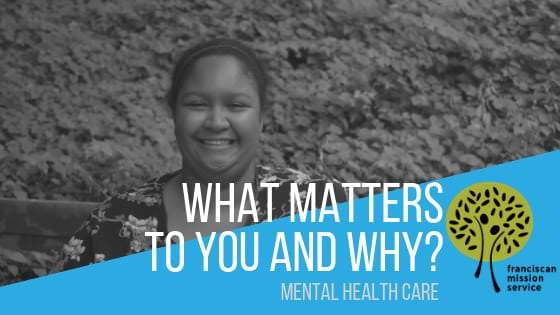A Passion for Mental Health Care

Editor’s Note: DC Service Corps member Amy Brandt invites us into a conversation she had with Nadia Barnett about her passion for mental health care.
Meet Nadia, a member of DC Service Corps class 2018-19. Nadia holds a degree in journalism and criminal justice from University of Maryland College Park and now volunteers in the office of United States Catholic Mission Association (USCMA). Nadia’s radiant smile and bubbly energy brings a beautiful warmth to the Casa San Salvador community. I had the pleasure of having a conversation with Nadia about the passions that motivate her.
What matters to you and why?
When asked “what matters to you and why?” Nadia responded confidently with the topic of Mental Health Care. Nadia has a deep awareness of the stigma around mental health care. She explains, “It is such a broad term that is often dramatized and romanticized, when in reality, mental illness runs rampant throughout many institutions. It has an umbrella effect which is the root cause of many issues such as: veteran employment, high school graduation rates, and prison populations.” Nadia highlights the barriers which impoverished communities and communities of color often face when it comes to accessibility of mental health care. “It has to do with stigmatization. As a black women, I do know that in the black community, mental health issues, such as anxiety, depression, and bipolar disorder, are often written off as laziness or exhaustion. It becomes a larger issue when communities as a whole are not taking the first step to recognize and seek mental health care.”
What sparked your interest in this topic?
In high school, Nadia sought out clubs that discussed the disparity between different communities. She would often witness serious topics being written off as unimportant, specifically within the younger generation. “I always strive to be aware of what impacts and what hinders a community.” Nadia began to ask herself “what change do I want to see?” and developed a passionate response rooted in de-stigmatization and the accessibility of information and resources.
Specifically, which resources do you wish to see an increased accessibility?
“Helplines, therapy at the high school level, stronger mental health education programs, and universal health care at the national level.” Nadia’s appreciation for human dignity is reflected in her belief that everyone in this country, regardless of race, class, or religion should have access to resources when it comes to mental health care.
Do you see yourself pursuing a career in mental health care?
With a degree in journalism and criminal justice, Nadia is drawn to a profession that revolves around people and the support of individually created change. Nadia desires to tell people’s stories, including their struggles and their triumphs. She explains, “there is so much that goes into mental health care, so if I can share the stories of real people, I can help change the stigmatization and encourage others to step away from labeling.” Nadia’s journalism serves as a vehicle to highlight human dignity and worth. “I love the term, ‘person-first’, and desire to incorporate that into my daily life. I would hope that in all my writings, the person-first mentality is the main takeaway.”
Reflection Question: What change do you wish to see implemented in today’s society? How can you get involved in the solution?

